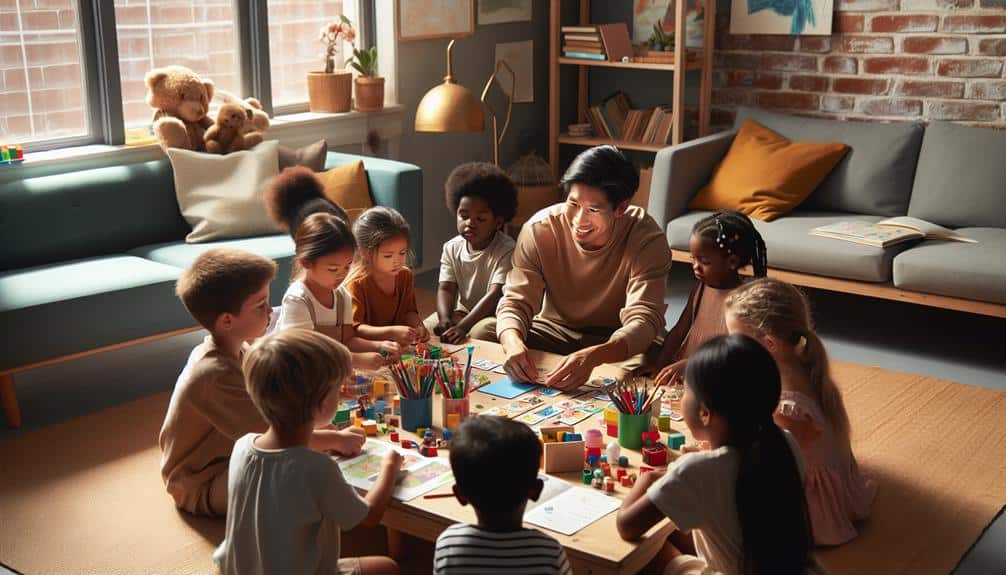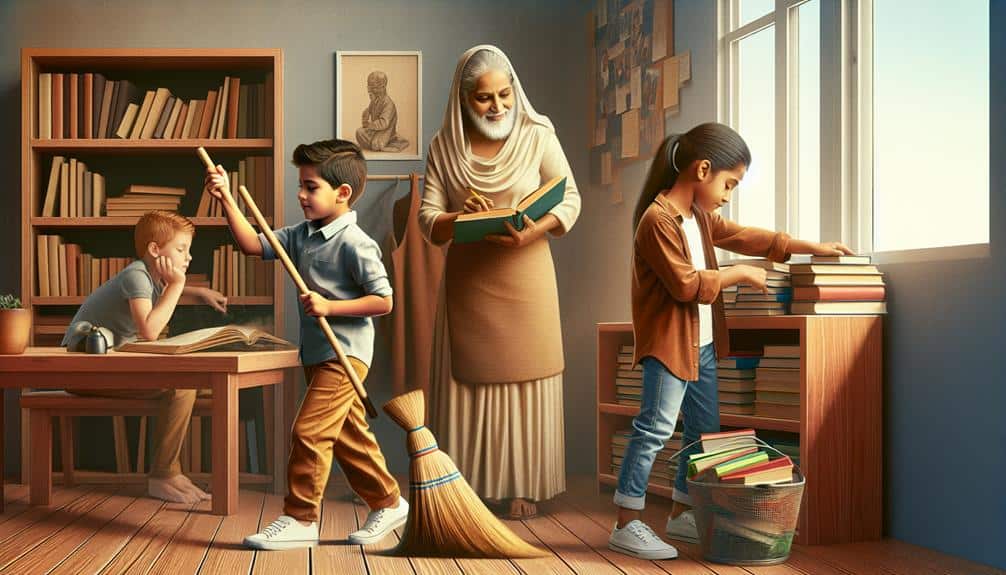To manage socialization concerns in homeschooling multiple children, prioritize parent involvement for fostering peer interactions. Arrange playdates, community classes, and group activities to nurture relationships. Be proactive in organizing social events with other homeschooling families to build a sense of community. Encourage sibling bonding to develop empathy and teamwork skills. Utilize community resources like libraries and museums for enriching experiences. Balance structured learning with social engagements to promote well-rounded development. By focusing on meaningful interactions and community involvement, you can guarantee holistic social growth for your children.
Key Points
- Organize group activities with other homeschooling families for social interaction.
- Encourage sibling bonding through shared activities to develop social skills.
- Utilize community resources like libraries and museums for socialization opportunities.
- Balance structured learning with peer interactions in homeschool co-ops.
- Prioritize a well-rounded schedule that includes both academics and social engagements.
Importance of Socialization in Homeschooling
Understanding the significance of socialization in homeschooling is essential for creating a well-rounded educational experience for your children. Parent involvement plays an important role in facilitating social interactions for homeschoolers.
As a parent, you have the opportunity to actively engage in your child's social development by organizing group activities, enrolling them in community classes, or arranging playdates. By taking an active role in fostering peer relationships, you can guarantee that your children have opportunities to interact with their peers, develop social skills, and build lasting friendships.
Peer relationships are an essential aspect of socialization for homeschooled children. While traditional schools offer daily interactions with peers, homeschoolers can cultivate meaningful relationships through various avenues. Encouraging your children to participate in group activities, sports teams, or clubs can provide them with opportunities to engage with peers in a structured setting.
Additionally, organizing social events with other homeschooling families can create a sense of community and belonging for your children. By prioritizing parent involvement and nurturing peer relationships, you can help your children develop strong social skills and thrive in their homeschooling journey.
Strategies for Social Interaction
To enhance socialization for your homeschooled children, implementing effective strategies for social interaction is key to their development and well-being. Playdates are a wonderful way for your children to engage with peers outside of the immediate family. Encouraging these interactions can help them develop important social skills such as communication, sharing, and cooperation. Scheduling regular playdates with other homeschooling families or neighbors can provide your children with diverse social experiences and opportunities to make new friends.
Sibling bonding is another essential aspect of socialization in a homeschooling environment. Encouraging your children to spend quality time together can foster strong relationships and teach them important values like empathy and teamwork. Organizing activities that require cooperation and collaboration, such as working on a puzzle together or engaging in a sibling book club, can strengthen the bond between siblings and create lasting memories.
Group Activities for Homeschooled Children
Engaging in group activities can provide homeschooled children with valuable opportunities for social interaction and skill development. Outdoor adventures offer a great way for kids to bond with peers while exploring nature and promoting physical activity. Consider organizing hiking trips, camping excursions, or nature scavenger hunts to encourage teamwork and a sense of adventure among homeschooled children.
Creative workshops are another fantastic option to nurture children's creativity and social skills. Hosting art classes, music sessions, or DIY crafting workshops can spark imagination and collaboration. These activities not only allow kids to express themselves but also foster communication and cooperation within a group setting.
Participating in group activities enables homeschooled children to build lasting friendships, enhance their socialization skills, and develop a sense of community outside the home.
Utilizing Community Resources
Consider tapping into local libraries, museums, community centers, and educational programs to enrich your homeschooling experience through the utilization of community resources. Engaging in community events and joining local groups can provide opportunities for your children to develop essential social skills while participating in extracurricular activities that complement your homeschool curriculum.
Libraries offer a wealth of resources such as books, educational materials, and even workshops or reading programs that can enhance your teaching.
Museums provide hands-on learning experiences that can bring history, science, and art to life for your children.
Community centers often host sports leagues, art classes, or clubs that allow kids to interact with peers outside the home environment.
Educational programs, whether online or in-person, can supplement your lessons and expose your children to new subjects or teaching methods.
Balancing Socialization With Academics
Finding a balance between socialization opportunities and academic pursuits is essential for homeschooling multiple children effectively. When juggling the educational needs of several children, scheduling challenges can arise. It's important to create a routine that allows time for both structured learning and social interactions. By establishing a well-thought-out schedule, you can guarantee that each child receives the necessary academic attention while also fostering their social development.
Peer relationships play a significant role in the socialization of homeschooled children. Encouraging positive interactions with peers through activities like homeschool co-ops, sports teams, or community classes can enhance their social skills and provide valuable friendships. These interactions not only offer a chance for socialization but also contribute to a well-rounded educational experience.
To effectively balance socialization with academics, consider incorporating group projects or collaborative learning activities that promote teamwork and communication among siblings. By integrating opportunities for peer interaction into your homeschooling routine, you can create a supportive environment that nurtures both academic growth and social development.
Frequently Asked Questions
How Can I Handle Conflicts Between Siblings During Homeschooling?
Managing conflicts between siblings during homeschooling is like maneuvering through a busy intersection. Address issues promptly, encourage open communication, and teach conflict resolution skills. Strengthen sibling relationships by fostering teamwork, empathy, and understanding to create a harmonious learning environment.
Are There Specific Socialization Challenges for Introverted Children?
When helping introverted children with socialization, consider their comfort levels and interests. Encourage small group activities, one-on-one interactions, and opportunities for quiet reflection. Validate their need for alone time while gently nudging them towards social engagements.
What Is the Best Approach for Socializing Homeschooled Teens?
To guarantee your homeschooled teens have ample socialization opportunities, consider joining homeschooling activities, local clubs, and community events. Encouraging participation in group sports, volunteering, or part-time jobs can also foster valuable social skills.
Can Homeschooling Multiple Children Lead to Socialization Gaps?
Homeschooling multiple children can actually enhance socialization skills. By fostering diverse peer interactions and engaging in group activities, you address socialization misconceptions and stereotypes. Embrace the opportunity to create a rich social environment for your kids.
How Do I Address Concerns About Socialization When Relatives Criticize Homeschooling?
When relatives criticize homeschooling, responding gracefully helps. Communicate openly about your educational choices. Seek support from other homeschooling families to build confidence. Remember, your decision is what's best for your children. Trust your instincts.



